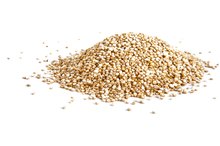What does fact checked mean?
At Healthfully, we strive to deliver objective content that is accurate and up-to-date. Our team periodically reviews articles in order to ensure content quality. The sources cited below consist of evidence from peer-reviewed journals, prominent medical organizations, academic associations, and government data.
- Mayoclinic.com; Vegetarian Diet: How To Get the Best Nutrition; Mayo Clinic Staff; 2010
- Harvard Health Letter; The Skinny on Popular Diets; 2005
The information contained on this site is for informational purposes only, and should not be used as a substitute for the advice of a professional health care provider. Please check with the appropriate physician regarding health questions and concerns. Although we strive to deliver accurate and up-to-date information, no guarantee to that effect is made.
Protein Needs for Blood Type A
The Blood Type Diet argues that people with blood type A should eat a vegetarian diet. However, the theory that diet should be determined by blood type is currently unsupported by scientific evidence. Everyone, no matter his blood type, needs to consume sufficient dietary protein.
Blood Type Diet and Protein
According to the Blood Type Diet, since blood type A developed in an agrarian culture, present-day people with blood type A should also eat a vegetarian diet. This may lead to questions about whether type As who were not previously vegetarians can continue to get enough protein in their diets. However, New York University’s Langone Medical Center points out that that no clinical studies support the blood type approach to diet planning, and that there is no scientific evidence that blood type determines protein needs 2.
Protein
Whey Protein and Type O Blood Types
Learn More
Protein is present in all tissues, from skin to muscles and organs, and is necessary to the body’s processes of repair, regeneration, growth and development. A complete dietary protein contains all nine of the essential amino acids that will be broken down to form proteins in the body. Complete proteins are only found in animal products and soybeans. Most vegetables and grains are incomplete proteins and need to be combined properly to make sure the body’s needs are met.
- Protein is present in all tissues, from skin to muscles and organs, and is necessary to the body’s processes of repair, regeneration, growth and development.
- Most vegetables and grains are incomplete proteins and need to be combined properly to make sure the body’s needs are met.
Protein Sources for Vegetarians
Because most plant sources of protein are incomplete, people of any blood type following a vegetarian diet need to be careful to eat many types of protein-rich foods. Vegetarians who eat dairy products and eggs -- or lacto-ovo vegetarians -- can get complete proteins from those sources. Protein is also available in meat substitutes; soybeans and soy products like tofu, tempeh and seitan; and beans, legumes, nuts and whole grains. Eating a wide variety is key to providing the entire range of amino acids necessary for conversion to protein in the body. For example, rice and beans make a complete protein when combined.
- Because most plant sources of protein are incomplete, people of any blood type following a vegetarian diet need to be careful to eat many types of protein-rich foods.
Other Protein-Rich Foods
Eating Plan for Type B Metabolism
Learn More
Animal products are the most complete sources of dietary protein. Lean red meats, fish and poultry are all rich in protein, as are eggs, yogurt and dairy products like cheese. The University of Maryland Medical Center recommends that adults consume two to three servings of dietary protein per day. A serving consists of 2 to 3 oz. of meat or fish; one-half cup of cooked dried beans served with brown rice; an egg; or 1 oz. of cheese. Most balanced diets provide enough protein, so protein supplements are rarely necessary.
- Animal products are the most complete sources of dietary protein.
- Lean red meats, fish and poultry are all rich in protein, as are eggs, yogurt and dairy products like cheese.
Related Articles
References
- Eat Right for Your Type: Official Website of Dr. Peter D’Adamo and the Blood Type Diet
- Langone Medical Center; Blood Type Diet: Eat Right for Your Type; Maria Adams; 2011
- Mayoclinic.com; Vegetarian Diet: How To Get the Best Nutrition; Mayo Clinic Staff; 2010
- Harvard Health Letter; The Skinny on Popular Diets; 2005
- Biochemistry, Essential Amino Acids - StatPearls - NCBI Bookshelf
- Protein for Life: Review of Optimal Protein Intake, Sustainable Dietary Sources and the Effect on Appetite in Ageing Adults
- Dietary Protein and Amino Acids in Vegetarian Diets—A Review
- Protein dietary reference intakes may be inadequate for vegetarians if low amounts of animal protein are consumed - PubMed
- Dietary Protein and Amino Acids in Vegetarian Diets—A Review
Writer Bio
Lucy Burns has been writing and editing professionally for more than 15 years. She earned an M.F.A. in creative writing from Cornell University and a Ph.D. in American literature from the University of North Carolina at Chapel Hill, where she teaches writing. Burns is a certified yoga teacher and is also licensed to teach the Gyrokinesis movement system.









